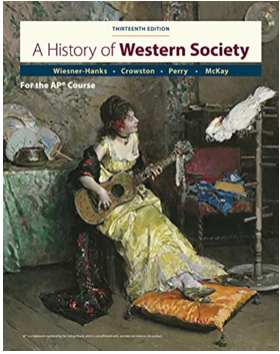
Online for the 2025-2026 School Year
Teacher: Michael Munson
Email: mjmunson719@gmail.com
AP European History 2025-26 School Year
Teacher: Michael Munson
Email: mjmunson719@gmail.com
Tuition: $700 for those registered by July 1, and $750 beginning July 2.
Enrollment: Follow this link to enroll in AP Euro 2025-26. If you are among the first 15 students to submit this form you will be automatically added to the class roster and receive an email verification of your status as an enrolled student in AP Euro 2025-26. If your registration is the 16th or later you will be informed that you have been added to the course waiting list according to the order in which your registration was received.
Who should take this course? High school students who recognize that AP European History is a college level study of modern European civilization and are interested in understanding the foundations of Western History from the late Medieval Period to the present. Students should also expect a weekly workload of approximately 8 hours that will include assigned readings, coursework, assessments, and Zoom meetings.
Course Materials:
Required Textbook: McKay’s A History of Western Society: Since 1300: AP Edition. 13th ed. Bedford/St. Martin's, 2020, John McKay; Clare Haru Crowston; Merry E. Wiesner-Hanks; Joe Perry.

ISBN-10: 1319221637 or ISBN-13: 978-1319221638
Notebook or Digital File: Students should have specific Notebook or digital document specifically for AP Euro to compile notes from Zoom meetings and course videos.
Recommended Supplement: Barron’s AP® European History Premium, 2022-23 edition or newer for personal review and practice.
Primary and Secondary Sources: Documents will be embedded in assignments or as stand-alone PDFs throughout the course.
Course content follows the historical themes listed below as required by the College Board and are incorporated into each unit of study:
- Interaction of Europe and the world,
- Economic and commercial development,
- Cultural and intellectual development,
- Emergence of nation states and other institutions of power,
- Social organization and development,
- The concept of national and European identity,
- Technological and scientific innovations
Technology Requirements:
-
- High-speed internet access
- Google account for email and joining the course on Google Classroom
- AP Classroom (you will receive an enrollment number and instructions in August)
- Zoom video from (for the live sessions--you only need the free version)
- Zoom video from https://zoom.us (for the live sessions--you only need the free version)
AP Euro school year:
The Course Begins on Monday August 18, 2025 with an introductory live meeting via Zoom. Weekly Zoom meetings and assignment postings will be posted on Google Classroom beginning on August 23
The Course will end in May of 2026 with the AP European History Exam. The specific date of the exam is not yet available.
Breaks during the school year:
- Thanksgiving Break: Nov. 24 - Dec. 1, 2025
- Winter Break: Dec. 22, 2024 - Jan. 5, 2026
- Spring Break: April 1 - April 10, 2026
Zoom Sessions: There will be a schedule of Zoom TWO required meetings each week.
Monday Zoom meetings each week will focus on developing essential historical reasoning and writing skills and be 30 to 45 minutes long.
Wednesday Zoom meetings each week will focus on an interactive discussion of course content and be approximately one hour.
*The times of the Zoom meetings on Mondays and Wednesday will be determined by class consensus with surveys that will take place in early August.
Learning Unit contents & sequence:
The course follows the College Board’s Course and Exam Description of AP European History and consists of nine specific units.
Unit 1: Renaissance and Exploration
Unit 2: Age of Reformation
Unit 3: Absolutism and Constitutionalism
Unit 4: Scientific, Philosophical, and Political Developments
Unit 5: Conflict, Crisis, and Reaction in the Late 18th Century
Unit 6: Industrialization and Its Effects
Unit 7: 19th-Century Perspectives and Political Developments
Unit 8: 20th-Century Global Conflicts
Unit 9: Cold War and Contemporary Europe
*Unit Guides from The College Board that describe essential content knowledge are provided with each unit. All discussions and assignments (including reading assignments) will be directly related to the learning objectives from these unit guides.
Weekly Assignments: Will be posted every Sunday (except during breaks) and appear on Google Classroom the Stream and Coursework Tabs and on the course calendar.
Assessments and Assignments: The AP European History Exam contains multiple choice questions (MCQs), short answer questions (SAQs), a document based essay question (DBQs), and a long essay question (LEQs). Each type of question is woven into course assignments and Unit Exams so that students have a full year of consistently practicing and developing the thinking and writing skills necessary for a successful AP Exam experience.
Instructor Qualifications:
Since 1992 Mr. Munson has taught multiple Advanced Placement courses. Over these years his students have performed remarkably well on AP exams. The mean score of his students on the 2024 AP European History exam was 4.25. He is a licensed 7-12 Social Studies teacher with BA degrees in history and secondary education-social studies from Bemidji State University and has accumulated over 70 graduate credits in teaching history.
